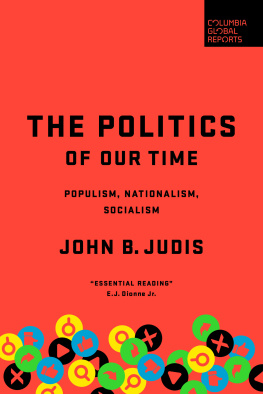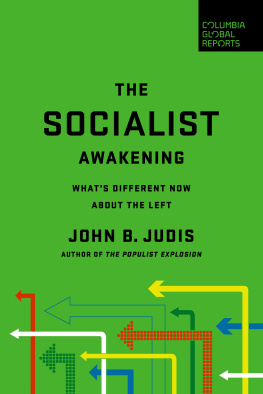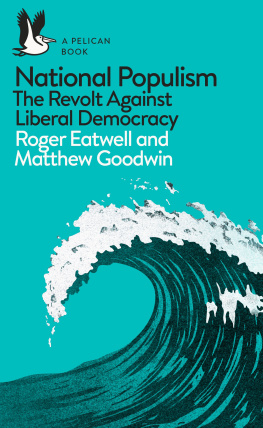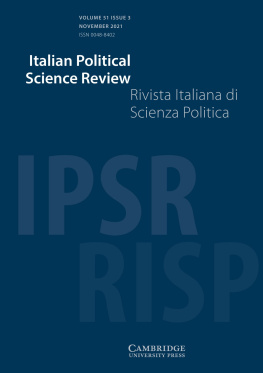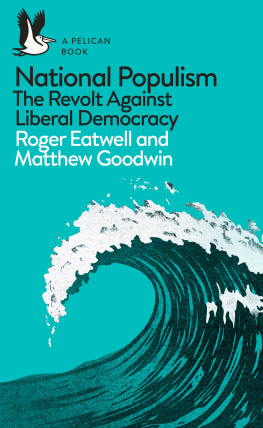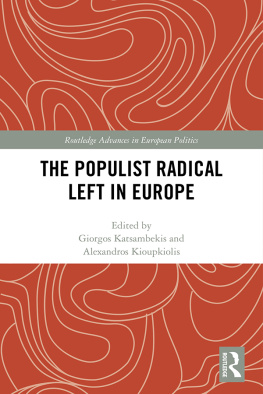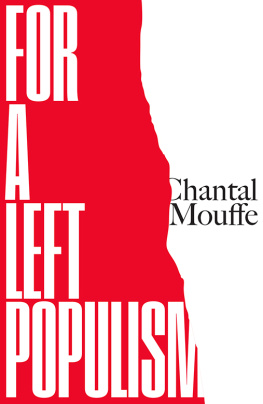Praise for The Populist Explosion
The Populist Explosion is far and away the most incisive examination of the central development in contemporary politics: the rise of populism on both the right and the left. John Judis, whose track record is unrivaled, is the ideal author to tackle the subject, and he has done a superb job, placing contemporary trends, including the rise of Donald Trump, in historical perspective. Judis demonstrates the crucial role of the 2008 recession both here and in Europe in discrediting the neoliberal agenda. This is must reading.
Thomas Edsall,
New York Times columnist
The Populist Explosion blends groundbreaking reporting with insightful scholarship in the best guide yet to the most important political phenomenon of our time.
Michael Lind,
author of Land of Promise:
An Economic History of the United States
John Judis demonstrates again why he is one of Americas best political journalists. There is no wiser or better informed analysis of contemporary voter discontent on both sides of the Atlantic than The Populist Explosion.
Michael Kazin,
editor of Dissent, author of The Populist Persuasion:
An American History and War Against War:
The American Fight for Peace, 1914-1918



Copyright 2016 by John B. Judis
All rights reserved
Published by Columbia Global Reports
91 Claremont Avenue, Suite 515
New York, NY 10027
globalreports.columbia.edu
facebook.com/columbiaglobalreports
@columbiaGR
Library of Congress Control Number: 2016945882
ISBN: 978-0997126457
Book design by Charlotte Strick and Claire Williams
Map design by Jeffrey L. Ward
Author photograph by Hilary P. Judis
For Jon Cohn, Richard Just, and Josh Marshall
CONTENTS
Populist parties and candidates are on the move in the United States and Europe. Donald Trump has won the Republican nomination; Bernie Sanders came in a very strong second to Hillary Clinton for the Democratic nomination. And these candidacies came on the heels of the Tea Party and Occupy Wall Street movements. In Europe, populist parties in France, Sweden, Norway, Finland, Denmark, Austria, Greece, Italy, Spain, and Switzerland are contending for power or are already part of the government.
In France, the National Front (FN) came in first in the regional elections in December 2015 with 27.73 percent of the vote, but was denied a victory in the regional presidencies because the Republican and Socialist parties joined forces against it in the runoff. In Denmark, the Peoples Party (DF) came in second in the June 2015 parliamentary elections. In Austria, Freedom Party (FP) candidate Norbert Hofer came in first in the first round of the presidential election in April 2016.
In Switzerland, the Swiss Peoples Party (SVP) came in first in the parliamentary elections with 29.4 percent of the vote, almost twice the total of the Social Democrats and the Liberals. In Norway, the Progress Party (FrP) has been part of the ruling government coalition since 2013. In the Netherlands, Geert Wilderss Freedom Party (PVV), currently the countrys third largest party, is well ahead in polls for the 2017 parliamentary elections. Britains United Kingdom Independence Party (UKIP), after disappointing results in the 2015 parliamentary elections, bounced back in local elections, ousting the Labour Party in Wales and was at the forefront of the British campaign to exit the European Union.
In Europe, populist parties have also arisen on the left and center-left. In Italy, comedian Beppe Grillos Five Star Movement won the most seats in the 2013 election to the Chamber of Deputies. In the June 2016 municipal elections, Five Star candidate Virginia Raggi was elected Romes mayor with 67 percent of the vote. In Spain, the Podemos Party, founded in 2014, came in third in the December 2015 and June 2016 parliamentary elections. In Greece, the decade-old Syriza Party came in first in two parliamentary elections in 2015, and took charge of the government. This book is about how these populist candidates and movements have come about, and why in the wake of the Great Recession, they have proven so successful in mobilizing support.
Defining Populism
When political scientists write about populism, they often begin by trying to define it, as if it were a scientific term like entropy or photosynthesis. Thats a mistake. There is no set of features that exclusively defines movements, parties, and people that are called populistfrom the Russian Narodniks to Huey Long, and from Frances Marine Le Pen to the late congressman Jack Kemp. As with ordinary language, even more so with ordinary political language, the different people and parties called populist enjoy family resemblances of one to the other, but not a set of traits can be found exclusively in all of them.
There is, however, a kind of populist politics that originated in the United States in the nineteenth century, has recurred in the twentieth and twenty-first centuries, and in the 1970s began to appear in Western Europe. Whereas populist parties and movements in Latin America have sometimes tried to subvert the democratic competition for power, the populist campaigns and parties in the United States and Western Europe have embraced it. In the last decades, these campaigns and parties have converged in their concerns, and in the wake of the Great Recession, they have surged. Thats the subject of this book: I want to say a little about what this kind of populist politics is, and why it includes both Trump and Sanders and both Frances National Front and Spains Podemos.
First of all, the kind of populism that runs through American history, and is transplanted to Europe, cannot be defined in terms of right, left, or center. There are rightwing, leftwing and centrist populist parties. It is not an ideology, but a political logica way of thinking about politics. In his book on American populism, The Populist Persuasion, historian Michael Kazin gets part of this logic. Populism, he writes, is a language whose speakers conceive of ordinary people as a noble assemblage not bounded narrowly by class; view their elite opponents as self-serving and undemocratic; and seek to mobilize the former against the latter.
Thats a good start. It doesnt describe someone like Ronald Reagan or Vladimir Putin, both of whom have sometimes been called populist, but it does describe the logic of the parties, movements, and candidates from Americas Peoples Party of 1892 to Marine Le Pens National Front of 2016. I would, however, take Kazins characterization one step further and distinguish between leftwing populists like Sanders or Podemoss Pablo Iglesias and rightwing populists like Trump and the National Fronts Le Pen. Leftwing populists champion the people against an elite or an establishment. Theirs is a vertical politics of the bottom and middle arrayed against the top. Rightwing populists champion the people against an elite that they accuse of coddling a third group, which can consist, for instance, of immigrants, Islamists, or African American militants. Leftwing populism is dyadic. Rightwing populism is triadic. It looks upward, but also down upon an out group.
Leftwing populism is historically different from socialist or social democratic movements. It is not a politics of class conflict, and it doesnt necessarily seek the abolition of capitalism. It is also different from a progressive or liberal politics that seeks to reconcile the interests of opposing classes and groups. It assumes a basic antagonism between the people and an elite at the heart of its politics. Rightwing populism, on the other hand, is different from a conservatism that primarily identifies with the business classes against their critics and antagonists below. In its American and Western European versions, it is also different from an authoritarian conservatism that aims to subvert democracy. It operates within a democratic context.
Next page

